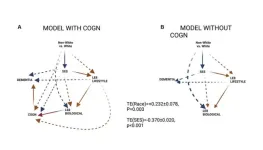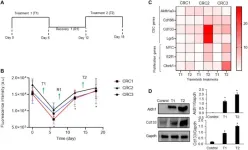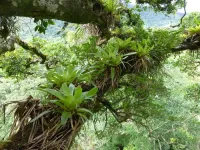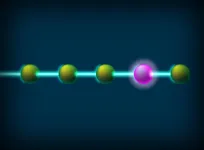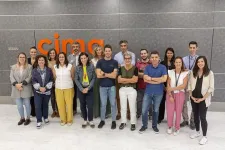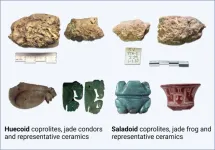(Press-News.org) CORVALLIS, Ore. – Researchers in the Oregon State University College of Engineering are spearheading a $2 million federal effort to explore new ways of developing electrical components that are better able to withstand extreme operating conditions, especially high temperatures.
The team will try to find novel, artificial-intelligence-based methods for designing and building long-lasting, high-efficiency electrical components for harsh-environment applications such as high-power radar and the aerospace, automotive and wireless communications industries.
“The semiconductor industry is reaching the limit of what is possible in terms of making devices smaller,” said Oregon State’s Tom Weller. “In order to remain on its remarkable, decades-long path of increasing performance and lowering cost, the industry is now shifting to new ways of packaging semiconductor devices. These packaging approaches introduce heat management challenges, some of which our research will attempt to address.”
Tom Weller, the Gaulke Chair in electrical engineering, will lead a collaboration that includes Oregon State’s Joshua Gess, Rob Stone, Chris Hoyle and Rachael Cate as well as researchers from Florida Atlantic University and the University of South Florida.
The project, part of the National Science Foundation Future of Semiconductors (FuSe) program, will be undertaken with simultaneous consideration of electrical, mechanical and thermal design, Weller said. Gess, Stone and Hoyle are mechanical engineering faculty, and Stone is also the head of OSU’s innovation-focused Impact Studio.
“The key to solving the difficult challenge of heat management includes a co-design methodology where all parts of the systems are optimized together instead of separately, using machine learning methods to accelerate the process,” Weller said. “The underlying technical advance is the introduction of fluid-based heat management structures that are directly integrated with the electrical devices. The research could lead to faster and cheaper electronics for computing and communicating in the future.”
The researchers will also set up an educational outreach program for students in grades 7-12 that will double as service-based learning opportunities for undergraduate and graduate students involved in the project.
“These service-based learning activities are aligned with a national model for advanced manufacturing education, with a special focus on including participants from historically marginalized groups,” Weller said.
END
Oregon State to lead $2M federal push toward more-efficient, longer-lasting electrical components
2023-10-11
ELSE PRESS RELEASES FROM THIS DATE:
Group led by University of Alaska Fairbanks gets $13.9 million to aid coastal climate resilience
2023-10-11
The National Science Foundation is funding a $13.9 million program led by the University of Alaska Fairbanks to help multiple communities respond to coastal erosion, flooding, permafrost thaw and other hazards attributed to climate change.
The four years of funding is part of the foundation’s Navigating the New Arctic program.
The funding supports AC³TION, a project led by the Alaska Coastal Cooperative at UAF in collaboration with the rural coastal communities, Arizona State University, the University of Northern Iowa and the University of Texas El Paso.
The group’s acronym stands for Alaska Coastal Cooperative for Co-producing Transformative Ideas and Opportunities ...
New study finds link between subjective and objective memory decline
2023-10-11
MINNEAPOLIS – Among people who report memory and thinking problems, some show no signs of a problem on standard tests, while others have subtle declines on their tests. A new study shows that people who have subtle problems with these tests may have an increased risk of developing mild cognitive impairment, which can be a precursor to dementia. The study is published in the October 11, 2023, online issue of Neurology®, the medical journal of the American Academy of Neurology.
“Several studies have found that people with subjective ...
New guidance issued on the determination of brain death
2023-10-11
MINNEAPOLIS – New guidance has been issued for clinicians on the determination of brain death, also known as death by neurologic criteria. A new consensus practice guideline, developed through a collaboration between the American Academy of Neurology (AAN), the American Academy of Pediatrics (AAP), the Child Neurology Society (CNS), and the Society of Critical Care Medicine (SCCM) is published in the October 11, 2023, online issue of Neurology®, the medical journal of the American Academy of Neurology.
This guideline updates the 2010 AAN ...
Insights on disparities in dementia from the UK Biobank study
2023-10-11
“The present study is among few to examine racial/ethnic disparities in dementia risk and their related pathways [...]. It is the first to do so in a UK population.”
BUFFALO, NY- October 11, 2023 – A new research paper was published in Aging (listed by MEDLINE/PubMed as "Aging (Albany NY)" and "Aging-US" by Web of Science) Volume 15, Issue 18, entitled, “Pathways explaining racial/ethnic and socio-economic disparities in dementia incidence: the UK Biobank study.”
Pathways explaining racial/ethnic disparities ...
Suppression of cancer stemness and drug resistance via BRAF/EGFR/MEK inhibition in colorectal cancer cells
2023-10-11
“[...] our approach enables mechanistic studies of drug resistance with 3D cultures of primary cancer cells to develop and test treatments that suppress cancer [...].”
BUFFALO, NY- October 11, 2023 – A new research paper was published in Oncotarget's Volume 14 on October 4, 2023, entitled, “Inhibiting BRAF/EGFR/MEK suppresses cancer stemness and drug resistance of primary colorectal cancer cells.”
Drug resistance is a major barrier against successful treatments of cancer patients. Gain of stemness under drug pressure is a major mechanism that renders treatments ineffective. Identifying ...
Epiphytes, amazing plants like moss and bromeliads found in trees, face growing threats
2023-10-11
Orchids, mosses, ferns—or epiphytes, defined as nonparasitic plants that grow on other plants—are crucial for Earth’s biodiversity and play essential roles in forests around the world, building habitat in trees for myriad other life forms, from bacteria and insects to birds and reptiles.
However, the very attributes that have enabled epiphytes to thrive in forest canopies are now making them vulnerable to both natural and human-caused disturbances, according to Nalini Nadkarni, the University of Utah biologist renowned for her pioneering work studying and conserving treetop ecosystems.
In a study published this month, Nadkarni found these vital plants ...
AI speeds up identification brain tumor type
2023-10-11
What type of brain tumor does this patient have? AI technology helps to determine this as early as during surgery, within 1.5 hours. This process normally takes a week. The new technology allows neurosurgeons to adjust their surgical strategies on the spot. Today, researchers from UMC Utrecht and researchers, pathologists and neurosurgeons from the Princess Máxima Center for pediatric oncology and Amsterdam UMC have published about this study in Nature.
Every year, 1,400 adults and 150 children are diagnosed with a tumor in the brain or spinal cord in the Netherlands. Surgery is often the ...
A new way to erase quantum computer errors
2023-10-11
Quantum computers of the future hold promise in solving all sorts of problems. For example, they could lead to more sustainable materials, new medicines, and even crack the hardest problems in fundamental physics. But compared to classical computers in use today, rudimentary quantum computers are more prone to errors. Wouldn't it be nice if researchers could just take out a special quantum eraser and get rid of the mistakes?
Reporting in the journal Nature, a group of researchers led by Caltech is among the first to demonstrate a type of quantum eraser. The physicists show that they can pinpoint and correct for mistakes in quantum computing ...
Blocking an immune molecule reduces tumor growth and prolongs survival in animal models of the most aggressive childhood cancer
2023-10-11
Researchers from Cima and the Clínica Universidad de Navarra, together with the international cooperative group Diffuse Midline Glioma (DMG-ACT), have confirmed that blocking an immune checkpoint molecule reduces the tumor and prolongs survival in animal models of the most aggressive childhood cancer. This research, carried out at the Cancer Center Clínica Universidad de Navarra, shows that inhibition of TIM-3 promotes the immune memory of diffuse intrinsic stem glioma (DIPG) and improves the prognosis of the disease.
DIPG is an aggressive brain stem tumor and the leading cause of death related to pediatric cancer. Due to its location therapeutic ...
Mummified poop reveals pre-Columbian cultures of the Caribbean consumed a diversity of plants, with peanuts, papaya, maize, and even cotton and tobacco detected
2023-10-11
DNA analysis of mummified poop reveals two pre-Columbian Caribbean cultures ate a wide variety of plants, like maize, sweet potato, and peanuts—and tobacco and cotton traces were detected too, according to a study published October 11, 2023 in the open-access journal PLOS ONE by Jelissa Reynoso-García from the University of Puerto Rico, Puerto Rico, and colleagues.
Mummified poop, or coprolites, can reveal clues to diet and lifestyle. In this study, Reynoso-García and colleagues analyzed plant DNA isolated from coprolites sampled from archeological sites of two pre-Columbian cultures (Huecoid and Saladoid) to see what these peoples ate ...
